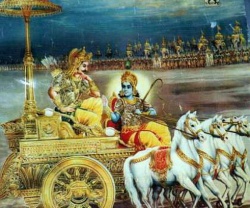Difference between revisions of "Svarga"
(Created page with "thumb|250px| In Hinduism, Svarga (or Swarga) (Sanskrit: स्वर्ग) also known as Swarga Loka is a one of seven loka or planes in Hindu cosmolog...") |
|||
| (5 intermediate revisions by 2 users not shown) | |||
| Line 1: | Line 1: | ||
[[File:Amaravati.jpg|thumb|250px|]] | [[File:Amaravati.jpg|thumb|250px|]] | ||
| − | In Hinduism, Svarga (or Swarga) (Sanskrit: स्वर्ग) also known as Swarga Loka is a one of seven loka or planes in Hindu cosmology, which sequentially are Bhu loka (Prithvi Loka, Earth), Bhuvar loka, Swarga loka, Mahar loka, Jana loka, Tapa loka, and the highest Satyaloka (Brahmaloka). | + | In {{Wiki|Hinduism}}, [[Svarga]] (or [[Swarga]]) ([[Sanskrit]]: स्वर्ग) also known as [[Swarga Loka]] is a one of seven [[loka]] or planes in {{Wiki|Hindu}} [[cosmology]], which sequentially are [[Bhu loka]] ([[Prithvi Loka]], [[Earth]]), [[Bhuvar loka]], [[Swarga loka]], [[Mahar loka]], [[Jana loka]], [[Tapa loka]], and the [[highest]] [[Satyaloka]] ([[Brahmaloka]]). |
| − | + | It set of [[heavenly]] [[worlds]] located on and above [[Mt. Meru]]. It is a [[heaven]] where the righteous [[live]] in a [[paradise]] before their next [[reincarnation]]. During each [[pralaya]] or the great [[dissolution]], the first three [[realms]] are destroyed that is [[Bhu loka]] ([[Earth]]), [[Bhuvar loka]], [[Swarga loka]]. Below all these upper [[realms]] lie seven [[realms]] of {{Wiki|Patala}}, the {{Wiki|underworld}} and [[Wikipedia:underworld|netherworld]] | |
| − | This is a "Good and nice" kind of temporary heaven where the soul enjoys all its Punya karmam before attaining either moksha, or rebirth according to its Karma. | + | [[Svarga]] is seen as a transitory place for righteous {{Wiki|souls}} who have performed [[good deeds]] in their [[lives]] but are not yet ready to attain {{Wiki|moksha}}, or elevation to {{Wiki|Vaikunta}}, the [[abode]] of {{Wiki|Lord}} {{Wiki|Vishnu}}, considered to be the Supreme [[Abode]] ({{Wiki|Rig Veda}} (1.22.20) states, [[Oṃ]] tad viṣṇoḥ paramam padam sadā paśyanti sūrayaḥ: |
| + | |||
| + | "All the [[suras]] (i.e., the [[devas]]) look towards the feet of [[Lord]] {{Wiki|Vishnu}} as the {{Wiki|Supreme Abode}}"). The capital of [[Svarga]] is {{Wiki|Amaravati}} and its entrance is guarded by {{Wiki|Airavata}}. [[Svarga]] is presided over by {{Wiki|Indra}}, the chief [[deva]]. | ||
| + | |||
| + | This is a "Good and nice" kind of temporary [[heaven]] where the {{Wiki|soul}} enjoys all its {{Wiki|Punya karmam}} before [[attaining]] either {{Wiki|moksha}}, or [[rebirth]] according to its {{Wiki|Karma}}. | ||
{{W}} | {{W}} | ||
[[Category:Buddhist Terms]] | [[Category:Buddhist Terms]] | ||
[[Category:Buddhist Cosmology]] | [[Category:Buddhist Cosmology]] | ||
| + | {{SanskritTerminology}} | ||
Latest revision as of 03:17, 21 September 2015
In Hinduism, Svarga (or Swarga) (Sanskrit: स्वर्ग) also known as Swarga Loka is a one of seven loka or planes in Hindu cosmology, which sequentially are Bhu loka (Prithvi Loka, Earth), Bhuvar loka, Swarga loka, Mahar loka, Jana loka, Tapa loka, and the highest Satyaloka (Brahmaloka).
It set of heavenly worlds located on and above Mt. Meru. It is a heaven where the righteous live in a paradise before their next reincarnation. During each pralaya or the great dissolution, the first three realms are destroyed that is Bhu loka (Earth), Bhuvar loka, Swarga loka. Below all these upper realms lie seven realms of Patala, the underworld and netherworld
Svarga is seen as a transitory place for righteous souls who have performed good deeds in their lives but are not yet ready to attain moksha, or elevation to Vaikunta, the abode of Lord Vishnu, considered to be the Supreme Abode (Rig Veda (1.22.20) states, Oṃ tad viṣṇoḥ paramam padam sadā paśyanti sūrayaḥ:
"All the suras (i.e., the devas) look towards the feet of Lord Vishnu as the Supreme Abode"). The capital of Svarga is Amaravati and its entrance is guarded by Airavata. Svarga is presided over by Indra, the chief deva.
This is a "Good and nice" kind of temporary heaven where the soul enjoys all its Punya karmam before attaining either moksha, or rebirth according to its Karma.
